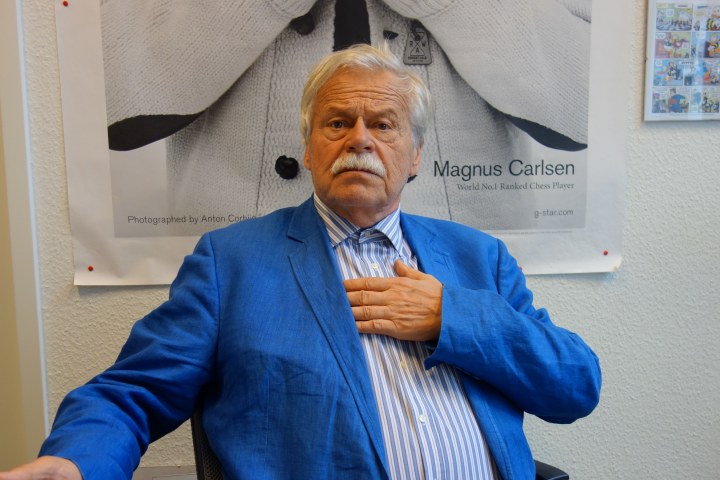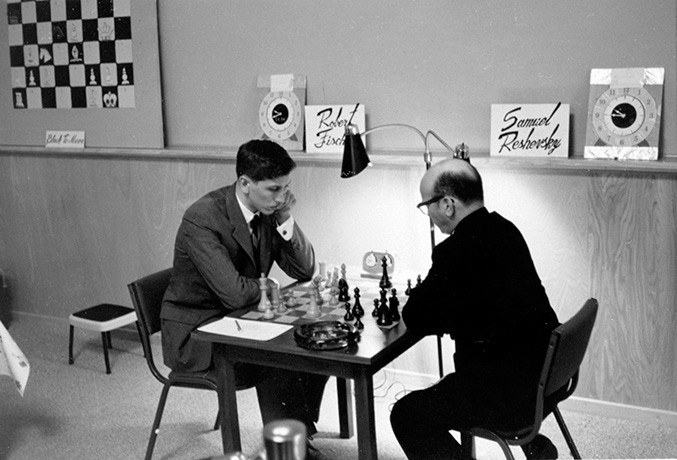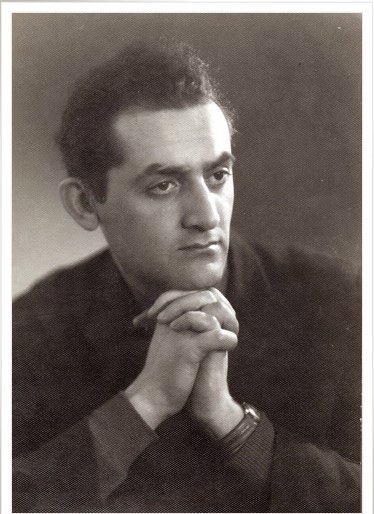


Follow the World Champion and your chess friend next door. Start your success story with ChessBase 14 and enjoy your chess even more! In addition to the ChessBase 14 Program, the Mega Package contains:
• Access to the Live-Database (8 million games)*
• Mega Database 2017
• CBMagazine subscription for a full year (6 issues)
• Database-Update-Service through end of 2017
• Full year Premium membership for playchess and for the ChessBase Accounts
Continued from Part 1, and Part 2
Basically, none of the non-English players was happy about the results or the conditions of the tournament. The new, young generation of English players was not yet ready for battle or was still going to school.
| Rk. | Title | Name | Country | 1 | 2 | 3 | 4 | 5 | 6 | 7 | 8 | 9 | 10 | Pts. |
| 1 | GM | Vlastimil Hort |
|
½ | ½ | ½ | 1 | ½ | 1 | ½ | 1 | ½ | 6.0 | |
| 2 | GM | Florin Gheorghiu |
|
½ | ½ | ½ | ½ | 1 | ½ | 1 | ½ | 1 | 6.0 | |
| 3 | GM | Alexey S Suetin |
|
½ | ½ | ½ | ½ | ½ | ½ | 1 | 1 | 1 | 6.0 | |
| 4 | GM | Leonid Stein |
|
½ | ½ | ½ | ½ | ½ | ½ | 1 | 1 | 1 | 6.0 | |
| 5 | GM | Predrag Ostojic |
|
0 | ½ | ½ | ½ | ½ | 1 | ½ | 1 | ½ | 5.0 | |
| 6 | IM | Julio P Kaplan |
|
½ | 0 | ½ | ½ | ½ | ½ | ½ | ½ | ½ | 4.0 | |
| 7 | IM | Andrew Jonathan Whiteley |
|
0 | ½ | ½ | ½ | 0 | ½ | ½ | ½ | ½ | 3.5 | |
| 8 | GM | Raymond Keene |
|
½ | 0 | 0 | 0 | ½ | ½ | ½ | ½ | ½ | 3.0 | |
| 9 | IM | William R Hartston |
|
0 | ½ | 0 | 0 | 0 | ½ | ½ | ½ | 1 | 3.0 | |
| 10 | IM | Michael J Basman |
|
½ | 0 | 0 | 0 | ½ | ½ | ½ | ½ | 0 | 2.5 |
But I had some money in my pocket because the organisers finally came through with the travelling expenses. Everything was very frugal — the Victoria Hotel only offered "Breakfast and Dinner", the organisers skipped lunch. In this time of need I discovered that just around the corner the English standard dish "fish and chips" was on offer and till the end of the tournament I ate there every day. Otherwise I more or less slept through the entire tournament.
But Leonid Stein had a deep longing for a modern western suit and I agreed to help him as a translator when he wanted to buy one. The salesman was polite and allowed him to try the waistcoat without commenting on the fact that Stein got it wrong (when he tried the waistcoat the buttons were on the back).
(In this somewhat embarassing situation a saying by Boguljubow came to my mind: "Right, right, but the other way round." It was one of Boguljubow's quirks to praise and to criticise his unfortunate opponents at the same time.)
Stein finally bought the suit and waistcoat and to thank me for my help he invited me to a cup of hot English tea. While we drank the tea he told me about a curious incident that happened to him in Baikal (see anecdote no. 8).
The English must be a very hairy nation because it is a luxury to have the heating on throughout the night. Moreover, in the Victoria hotel everything was rusty. We, the guests of the hotel, received two warm blankets for the night, plus two hot bricks — which came as a surprise to me. Why on earth did I not bring another sweater?
On the last day of the tournament the former Czech master Cenek Kottnauer came visiting. After the Chess Olympiad in Amsterdam 1954, he had not returned to Prague. "Kentaur" — his nickname in Prague — treated me very friendly.
He still had a great interest in chess but he had never dared to become a professional in England. With the import and export of fruit and vegetables he could very well survive in his new home country. "Yes, the English are very polite, yes, but, Vlastimil beware of pickpockets. The thiefs are everywhere."
He found my "fir tree" story very amusing and he was invited to join the closing banquet with Yorkshire pudding and the obligatory toast to the queen.
During my return trip to Prague we met by chance on the train to London. The compartment was totally overcrowded — and a seat was not in sight. Suddenly Cenek touched his breast and went very pale. I was about to give first aid when he groaned: "No, no, thank you Vlastimil, it was only my purse with all documents."
The "Iron Curtain" was waiting. I was not yet ready to take the step the "Kentaur" had taken in Amsterdam. The state needed my British pounds...
Please, "keep smiling" and read my anecdotes:
In Lone Pine 1974 Isaac Kashdan told me the following story. When the old champion Reshevsky and the newcomer Fischer played a match in 1961 they had conflicts from the very start. The two squabblers could not agree on one single thing and every single article in the match contract was argued and argued again. The pivotal point was the temperature in the playing hall. Reshevsky seemed to be a fan of tropical heat while Fischer had a preference for antarctic temperatures. An irresolvable problem was looming. Did the organisers ask King Salomon for help? When Reshevsky was to move the air conditioning was off. But the very moment he had made his move the air conditioning started and cold air was streaming into the playing hall.

Fischer-Reshevsky | Photo: World Chess Hall of Fame
During the unfinished match (after eleven games the score was 5½ : 5½ but then Fischer left though initially the match was to go over 16 games) for the first — and hopefully the last — time in the history of chess there was an air conditioning arbiter.
(I like to imagine the following situation: Reshevsky is in severe time-trouble. Click — Reshevsky moves — clack — Fischer replies — click, clack, click, clack… until the air conditioning breaks down! What a fun!)
Master Class Vol.1: Bobby Fischer
No other World Champion was more infamous both inside and outside the chess world than Bobby Fischer. On this DVD, a team of experts shows you the winning techniques and strategies employed by the 11th World Champion.
Grandmaster Dorian Rogozenco delves into Fischer’s openings, and retraces the development of his repertoire. What variations did Fischer play, and what sources did he use to arm himself against the best Soviet players? Mihail Marin explains Fischer’s particular style and his special strategic talent in annotated games against Spassky, Taimanov and other greats. Karsten Müller is not just a leading international endgame expert, but also a true Fischer connoisseur.
In Hastings Leonid Stein told me about his adventures at Lake Baikal:
"One day I got an invitation to play a simul in the depths of Siberia. Why not, I said to myself? A bit later I even got a call. It was the secretary of the organiser who was to offer me even better conditions. Now I was very curious. The organiser, the director of the wood-combine, was a passionate chess player but unfortunately he was also a bad loser.
 I was asked to take that seriously into account. He was a very generous sponsor: I was allowed to visit the scene of crime a few days earlier, a lot of presents and extras were raining down on me and the whole surrounding was fantastic. Therefore I did not mind to treat my sponsors with kid gloves. But it was difficult! Because the director had no clue at all about chess and after an endless game I was relieved when I could finally give a perpetual. Draw!
I was asked to take that seriously into account. He was a very generous sponsor: I was allowed to visit the scene of crime a few days earlier, a lot of presents and extras were raining down on me and the whole surrounding was fantastic. Therefore I did not mind to treat my sponsors with kid gloves. But it was difficult! Because the director had no clue at all about chess and after an endless game I was relieved when I could finally give a perpetual. Draw!
'Damn it', my opponent cursed after the game. 'I have played against Botvinnik, Karpov, Spassky, and other famous grandmasters. Always a draw! Why can I never win a game?'
I firmly bit my tongue to avoid saying things I would come to reget, and was keen to take the next train to Moscow to forget this terrible game quickly."
In the 70s I was invited to Schondorf, near Stuttgart, in Germany. For years the poster with the announcement "IGM Vlastimil Hort will play a blindfold simultaneous on 12 boards in the lounge of the 'Volksbank'" was hanging on the wall of my flat in Cologne.
The first three hours of such a crazy undertaking are the most difficult. Absolute concentration is a must! The lounge of the "Volksbank" was full of people while I was sitting in a comfortable leather chair in a quiet adjoining room. My memory was working at full capacity when suddenly a lady with a little hat and a loden coat breezed in and asked me for an autograph. Then she asked for two more. To top it all she also asked me to sign the poster mentioned above. Although I was irritated and stressed I still gave her a rose from the flower bouquet of the organisers. After all, I try to be a gentleman in each and every situation. The train of madness slowly reached the first station, but it took me a while to get a grip on my opponents.
Suddenly there's commotion in my refuge. What happened? The president of the chess club and the director of the bank entered my territory and disturbed my circles. "Mr. Hort, we do bring you the scoresheets of the games. You can look at them later, but first we want to tell you something." Though my concentration was waning, I was curious. "Did you see a lady in a Bavarian loden coat?" I nodded and thought of the positions that were threatening to vanish to oblivion from my inner eye. "Well, this lady grabbed the microphone from me to make an important announcement to the public. 'All this is a big hoax, the grandmaster is not blind at all!'"
And then I understood why she had looked so deep into my eyes when I signed the autographs.
Translation from German: Johannes Fischer